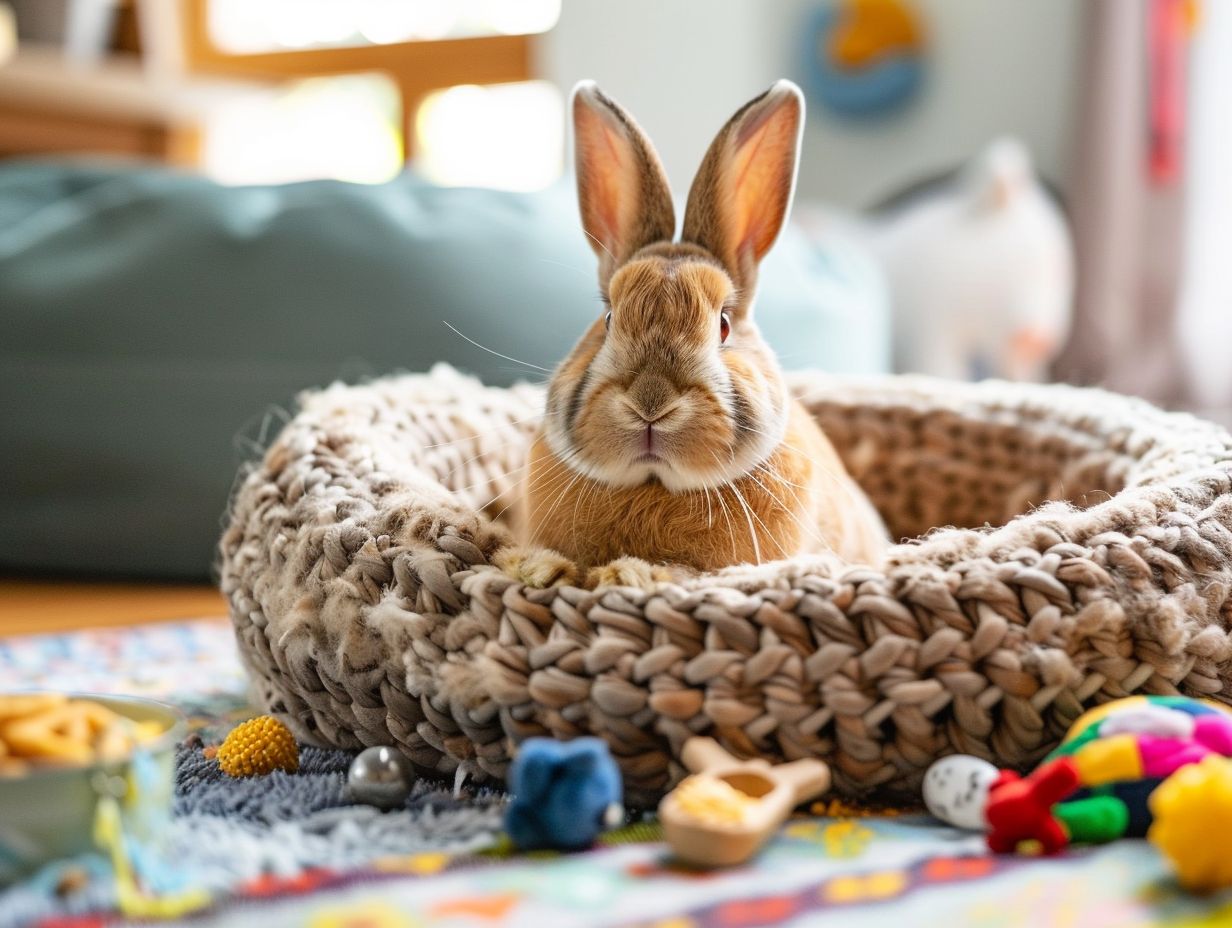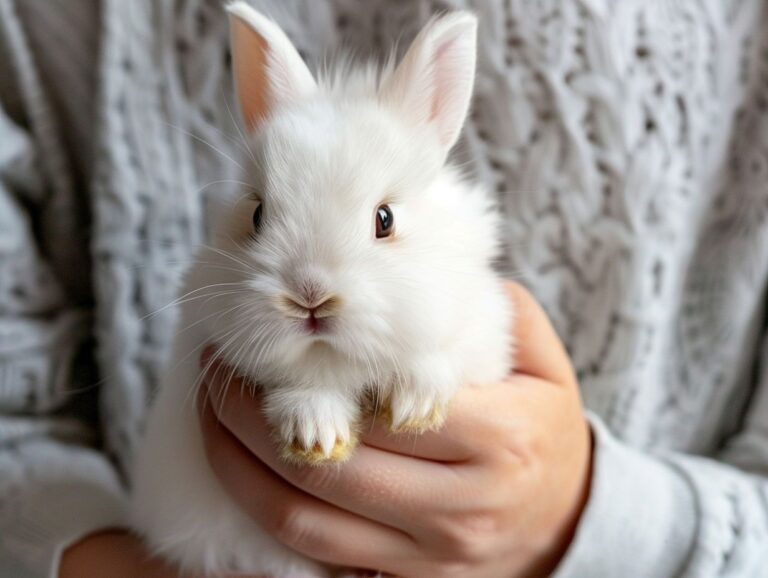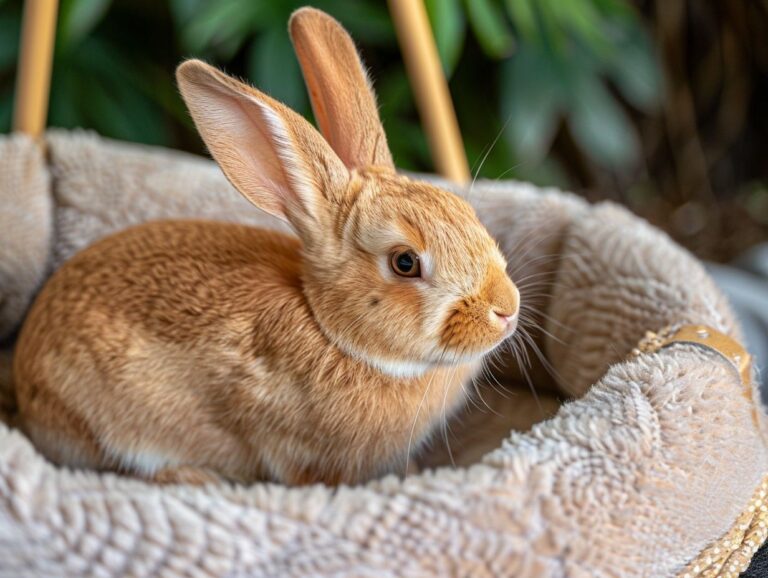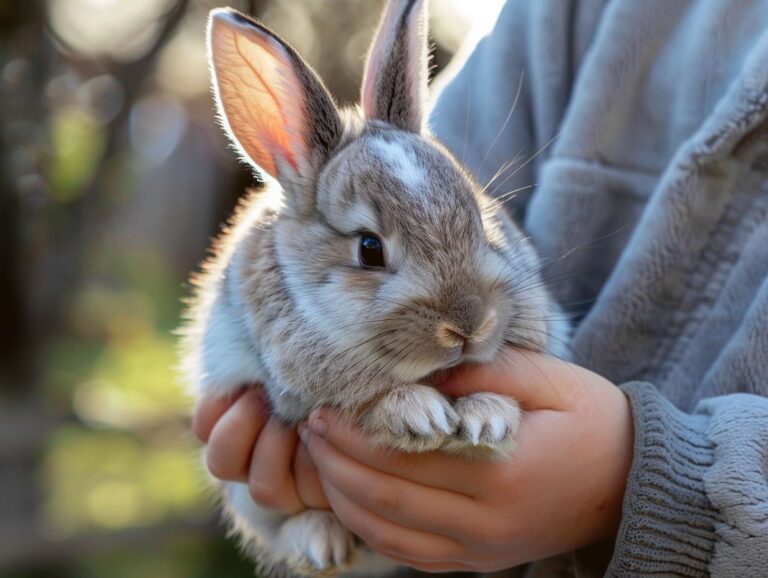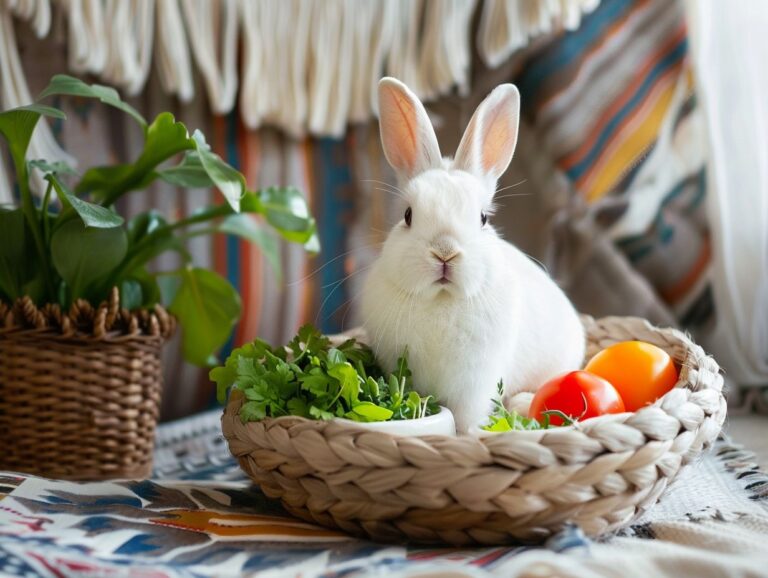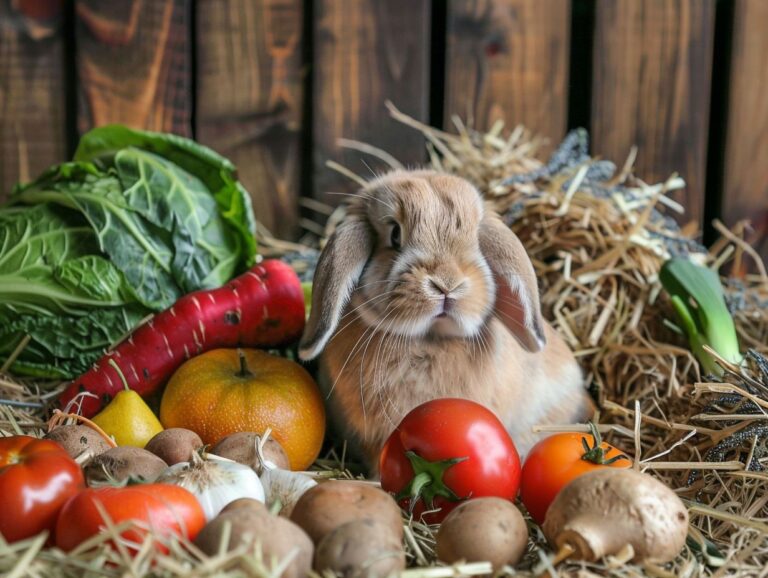Havana Rabbits As Pets: Care, Diet, and Health For Small Breeds
Curious about Havana rabbits? These charming small-sized pets are a delightful addition to any household. From their distinctive coat and color to their friendly temperament, there’s a lot to love about these furry companions.
We’ll explore the characteristics of Havana rabbits, their basic needs, common health issues, and essential care tips. Whether you’re a seasoned rabbit owner or considering getting one for the first time, this comprehensive guide has everything you need to know to keep your Havana rabbit happy and healthy.
Key Takeaways:
What Are Havana Rabbits?
Havana rabbits belong to a specific breed known for their unique characteristics and history. These rabbits are recognized for their distinctive features and have a rich lineage associated with them.
Hailing from Europe, Havana rabbits were first developed in the early 1900s, particularly in Holland. These rabbits are highly sought after for their stunning coat color, which is a rich, chocolate brown often likened to the color of Cuban cigars. Due to their charming appearance and gentle temperament, Havana rabbits have gained popularity as both show rabbits and beloved pets worldwide. The American Rabbit Breeders Association (ARBA) officially recognized Havana rabbits as a distinct breed in 1916, cementing their place in the rabbit breeding community.
What Are The Characteristics Of Havana Rabbits?
Havana rabbits exhibit a range of traits that make them unique among rabbit breeds. From their size and fur characteristics to their behavior and color variations, Havana rabbits have distinct features that set them apart.
One of the most striking physical attributes of Havana rabbits is their compact, muscular build, giving them a sturdy appearance. Their fur is glossy and plush, often described as a rich, deep, chocolate-brown color. These rabbits are known for their friendly and calm demeanor, making them popular as pets. In terms of behavior, Havana rabbits are intelligent and energetic, enjoying social interaction with humans. Their color patterns, ranging from solid to shaded, add to their allure, with most exhibiting a solid coat color that epitomizes the breed’s elegance.
Size and Weight
In terms of size and weight, Havana rabbits typically fall within a specific range that distinguishes them from other breeds. Understanding the dimensions of Havana rabbits is essential for proper care and handling of these adorable creatures.
On average, Havana rabbits reach a size of around 5 to 8 pounds, with females usually being slightly larger than males. Their ideal weight also depends on their age, as younger rabbits will naturally weigh less. As for their size, they typically measure between 17 to 20 inches in length when fully grown.
A key consideration with Havana rabbits is ensuring they receive a balanced diet to support their growth. Providing them with a mix of hay, fresh vegetables, and pellets tailored to their size and activity level is crucial for their overall health and development.
Coat and Color
The coat and coloration of Havana rabbits play a significant role in distinguishing them from other rabbit breeds. Their fur texture and hue variations add to the charm of these lovely creatures.
Havana rabbits are appreciated for their lush fur that is dense, smooth, and often has a glossy sheen, making them quite visually appealing. They typically have a solid rich chocolate brown color that is even and lustrous. One of the fascinating color variations found in Havanas is the ‘blue’ gene, which dilutes the brown to create a stunning silver-grey hue known as ‘chocolate blue.’ This unique color shift further sets them apart from other breeds.
Temperament and Behavior
Understanding the temperament and behavior of Havana rabbits is crucial for creating a harmonious environment for them. These rabbits exhibit specific traits and behaviors that can influence their care and interaction with humans.
These rabbits are known for their curious nature, often seen exploring their surroundings with interest and vigor. They are intelligent animals that thrive on mental stimulation, making puzzle toys and enrichment activities ideal for keeping them engaged. Havana rabbits are generally sociable and enjoy interaction with their owners, forming strong bonds with those who provide them with love and attention.
What Are The Basic Needs Of Havana Rabbits?
Providing for the basic needs of Havana rabbits is essential to ensure their well-being and happiness. From suitable housing arrangements to a balanced diet and regular exercise, meeting these requirements is crucial for the health of these adorable pets.
In terms of housing, Dutch rabbits as pets need a spacious and secure enclosure that allows them to move around freely. Providing ample room for hopping and exploring is important to prevent boredom and ensure mental stimulation. Including hiding spots and tunnels in their living space can mimic their natural habitat and promote their overall well-being.
As for their diet, fresh hay should make up the majority of a tan rabbits‘ food intake. High-quality rabbit pellets, supplemented with fresh vegetables and limited fruits, can provide essential nutrients for their growth and health. It’s crucial to avoid feeding them foods high in sugar or fat, as these can lead to health issues.
In terms of exercise, Polish rabbits as pets are active animals that require daily opportunities to run and play. Providing them with toys such as tunnels, balls, and chewing blocks can help keep them physically active and mentally engaged. Interaction with their human companions through gentle handling and playtime is also beneficial for their social and emotional well-being.
In terms of grooming, Havana rabbits have a short, dense fur that requires regular brushing to prevent matting and reduce shedding. Weekly grooming sessions can help maintain the cleanliness of their coat and reduce the risk of hairballs. Checking their nails and teeth regularly is important to ensure their overall health and comfort.
Housing Requirements

In terms of cage size, Havana rabbits require ample space to move around comfortably. A large enclosure is recommended, at least four square feet, to allow them to exhibit their natural behaviors like hopping and exploring. It’s important to provide a solid bottom to avoid injury to their delicate feet.
As for bedding choices, opt for soft hay or paper-based bedding to create a cozy and clean living environment for your Havana rabbit. Ensuring proper ventilation and maintaining optimal temperature levels in their habitat is crucial for their health and happiness.
Diet and Nutrition
Maintaining a balanced diet and proper nutrition is key to the health and longevity of Havana rabbits. From essential hay and pellets to fresh vegetables, these rabbits have specific dietary requirements that owners must fulfill.
Hay plays a crucial role in a Havana rabbit’s diet as it aids in digestion and helps maintain dental health. Quality hay should always be available, with Timothy hay being the preferred option. Along with hay, pellets formulated specifically for rabbits provide essential nutrients such as fiber, protein, and vitamins.
Vegetables are also an important component of a Havana rabbit’s diet, offering vitamins, minerals, and hydration. Not all vegetables are safe for rabbits, and owners should carefully select and introduce them to avoid digestive issues.
Exercise and Playtime
Engaging Havana rabbits in regular exercise and playtime activities is essential for their physical and mental well-being.
Havana rabbits are naturally curious and energetic, requiring mental stimulation and physical exertion to thrive. Providing them with opportunities to hop, jump, and explore not only keeps them physically fit but also helps prevent behavioral issues that may arise from boredom or pent-up energy.
Setting up a designated play area with tunnels, platforms, and toys can encourage these rabbits to engage in more active play. Introducing obstacle courses or puzzle feeders can challenge them mentally while they exercise.
Grooming and Hygiene
Regular grooming and hygiene practices are essential for keeping Havana rabbits healthy and comfortable. Proper grooming not only enhances their appearance but also helps prevent potential health issues associated with their fur and skin.
Brushing Havana rabbits regularly is crucial to remove loose fur, prevent matting, and distribute natural oils for a healthy coat. It is recommended to use a soft brush or comb designed for small pets.
Trimming their nails is another important aspect of grooming to avoid overgrowth, which can lead to discomfort and problems with movement. Ensure to use proper pet nail clippers and be cautious not to cut into the quick.
When bathing Havana rabbits, only do so when necessary, using gentle pet-safe shampoo and lukewarm water. Excessive bathing can strip their fur of natural oils, causing dryness.
What Are The Common Health Issues Of Havana Rabbits?
Havana rabbits are prone to certain health issues that owners need to be aware of to ensure their pets lead a healthy life. From dental problems and obesity to parasitic infestations, understanding and addressing these common health issues is crucial for their well-being.
Dental issues can be a significant concern for Havana rabbits due to their continuously growing teeth. Without proper wear and tear, rabbit teeth can become overgrown, leading to pain, difficulty eating, and other complications. Regular dental check-ups by a veterinarian are essential to prevent and address these problems.
Obesity is another common issue that can impact Havana rabbits. Providing a balanced diet with the right amount of hay, vegetables, and pellets, along with regular exercise, is key to maintaining a healthy weight and preventing silver rabbit health issues.
Gastrointestinal problems, such as GI stasis, can also affect Havana rabbits, causing a slowdown or blockage in their digestive system. Ensuring a fiber-rich diet, adequate hydration, and a clean living environment can help reduce the risk of these issues.
Dental Problems
Dental problems, such as overgrowth of teeth, can pose serious health risks for Havana rabbits. Regular teeth trimming and proper dental care are essential to prevent and manage these issues effectively.
In Havana rabbits, dental problems often stem from the nature of their teeth, which continuously grow. If not worn down through chewing, these teeth can become overgrown, leading to malocclusion and other oral complications.
- One of the common symptoms of dental problems in Havana rabbits is difficulty eating or loss of appetite due to the pain caused by abnormal teeth growth.
- Regular veterinary check-ups are crucial for early detection of dental issues in Havana rabbits. Through dental exams, veterinarians can identify any overgrown teeth or signs of infection promptly.
- Treatment of dental problems in Havana rabbits may involve teeth trimming, which should be performed by experienced professionals to avoid injuring the delicate oral tissues.
Gastrointestinal Issues
Gastrointestinal problems can impact the overall health and well-being of Havana rabbits. Understanding the signs of digestive issues and implementing appropriate dietary adjustments are crucial for maintaining their digestive health.
Common causes of gastrointestinal issues in Havana rabbits include dietary indiscretions, stress, and infections. These can manifest through symptoms like changes in appetite, irregular bowel movements, abdominal pain, and bloating. If left untreated, these problems can escalate and lead to serious complications.
Proper nutrition plays a vital role in preventing and managing gastrointestinal issues. High-fiber foods, hay, and fresh vegetables are essential components of a healthy rabbit diet that promotes good digestion. Regular veterinary check-ups and monitoring the rabbit’s feces consistency can help detect early signs of digestive problems.
Respiratory Infections

Respiratory infections can pose a significant threat to the health of Havana rabbits, especially in varying temperature conditions. Maintaining an optimal environment and seeking prompt veterinary care are essential in managing and preventing respiratory issues.
Common causes of respiratory infections in Havana rabbits include exposure to drafts, dusty environments, and poor ventilation. Symptoms may manifest as nasal discharge, sneezing, labored breathing, and reduced activity levels.
To prevent these infections, it is crucial to provide a well-ventilated living space, free from pollutants and with controlled humidity levels. Regular cleaning of cages, providing fresh bedding, and a balanced diet rich in Vitamin C can boost their immune system and reduce the risk of respiratory illnesses.
Parasites
Parasitic infestations can affect the health and comfort of Havana rabbits if left untreated. Regular cleaning of the litter box and preventive measures against parasites are crucial for safeguarding the well-being of these adorable pets.
Havana rabbits are susceptible to various common parasites such as mites, fleas, and intestinal worms. These parasites can cause discomfort, skin irritation, digestive issues, and even lead to more serious health complications if not addressed promptly.
To prevent parasitic infestations, pet owners should maintain a strict hygiene routine for their rabbits. Regular vet check-ups and administering preventive treatments recommended by the veterinarian are essential to keep parasites at bay.
Ensuring a clean living environment for Havana rabbits is crucial. Regularly cleaning their habitat, including cages, bedding, and food/water containers, can help reduce the risk of parasitic infections.
How To Care For A Havana Rabbit?
Proper care and attention are essential for ensuring the health and happiness of Havana rabbits. From regular vet check-ups to providing a safe living environment and addressing their dietary and grooming needs, comprehensive care is vital for these lovely pets.
In terms of veterinary care, it’s advisable to find a rabbit-savvy veterinarian who can provide specialized treatment and advice. Regular check-ups help in detecting any health issues early and ensuring your furry friend’s well-being.
- Environmental considerations play a crucial role in Havana rabbit care. Ensure they have a spacious hutch or pen, complete with cozy bedding, plenty of space to hop around, and protection from extreme temperatures.
Dietary requirements are another key aspect. Offer a balanced diet of hay, fresh vegetables, and quality rabbit pellets to meet their nutritional needs and promote digestion.
Grooming practices are essential for maintaining your Havana rabbit’s coat health. Regular brushing, nail trimming, and keeping their living area clean can prevent matting and health issues.
Regular Vet Check-ups
Scheduling regular veterinary check-ups is a crucial aspect of caring for Havana rabbits. These routine visits help monitor their health, address any emerging issues, and ensure they receive timely medical attention when needed.
Veterinary check-ups for Havana rabbits typically should be scheduled at least once a year to assess their overall health and well-being.
During these visits, the veterinarian will conduct a thorough physical examination, check for any signs of illness, and discuss preventive health measures.
Preventive care may include vaccinations, parasite control, dental checks, and recommendations for a balanced diet and exercise routine.
Regular check-ups also provide an opportunity for rabbit owners to ask questions, seek advice on nutrition, behavior, and environmental enrichment.
By partnering with a knowledgeable veterinarian, Havana rabbit owners can ensure the long-term health and happiness of their beloved pets.
Providing A Safe And Stimulating Environment
Creating a safe and stimulating environment is essential for the overall well-being and happiness of Havana rabbits. Ensuring a secure living space, ample exercise opportunities, and mental stimulation are key aspects of providing a nurturing environment for these pets.
When setting up a safe living space for Havana rabbits, it’s crucial to choose a cage that is not only spacious but also escape-proof to prevent any potential hazards. Providing ample room for them to hop, stretch, and explore is vital for their physical and mental health.
Incorporating various exercise options like tunnels, ramps, and safe chew toys can keep these energetic rabbits engaged and active. Environmental enrichment through activities such as hiding treats, introducing new toys, and rotating playthings can prevent boredom and encourage natural behaviors.
Proper Diet And Nutrition
A balanced diet and proper nutrition play a critical role in caring for Havana rabbits. Providing the right mix of food, fresh vegetables, and clean water is essential for meeting their dietary needs and ensuring their optimal health.
Among the key dietary requirements for Havana rabbits is a good balance of hay, fresh greens, and high-quality pellets. The feeding schedule should include daily offerings of hay and fresh vegetables such as dark leafy greens. These rabbits also benefit from a small portion of pellets to ensure they receive essential nutrients.
Hydration is equally crucial. Water should always be made available in a clean bowl or sipper bottle, as rabbits need constant access to fresh water to maintain their health.
Grooming And Hygiene
Regular grooming and hygiene practices are essential aspects of caring for Havana rabbits. Proper fur maintenance, grooming routines, and attention to their fur color variations contribute to their overall health and well-being.
Grooming requirements for Himalayan rabbits involve regular brushing to prevent matting and remove loose fur. Bathing should be done infrequently, as their skin is sensitive, using rabbit-safe shampoo. Trimming the nails regularly is crucial to avoid overgrowth. Daily checks for any signs of parasites or skin issues are recommended. For more information, you can check out this guide on Himalayan rabbits as pets.
In terms of fur care tips, owners should pay attention to the luxurious Havana rabbit fur, which varies from a rich chocolate brown to a deep black color. Gentle grooming with a slicker brush helps maintain the sheen and softness of their coat, enhancing their natural beauty. Learn more about Belgian Hare rabbits as pets.
Maintaining a clean living environment for Havana rabbits is also crucial for their hygiene. It is important to regularly clean their living space, provide fresh bedding, and ensure proper ventilation to prevent any unpleasant odors or health issues.
What Are Some Tips For Bonding With A Havana Rabbit?

One key strategy for bonding with a Havana rabbit is to create a consistent routine that includes regular interaction and playtime. Consistency helps them feel secure and builds trust over time. Offering your rabbit healthy treats like fresh fruits and vegetables can strengthen the bond through positive reinforcement.
Socialization is crucial for Havana rabbits, so introducing them to different environments and experiences gradually can help them feel more comfortable and confident. Providing a safe and enriching environment with toys and hiding spots will also encourage their natural behaviors and promote a happy and bonded relationship.
What Are Some Fun Facts About Havana Rabbits?
Exploring the fascinating world of Havana rabbits reveals a treasure trove of fun facts and intriguing information about this enchanting breed. From their unique history and behavior quirks to their impressive lifespan, Havana rabbits are full of surprises that delight and captivate rabbit enthusiasts.
Harlequin rabbits as pets originated in Europe, particularly in Holland, in the early 20th century. Their distinctive appearance with a glossy, black fur coat and compact body sets them apart from other rabbit breeds. These rabbits are known for their friendly and sociable nature, making them excellent companions for both individuals and families. Interestingly, Havana rabbits have a playful side, enjoying toys and activities that stimulate their intelligent minds. Their affectionate demeanor and adaptability make them a beloved choice among rabbit enthusiasts around the world.
Learn more about caring for Florida white rabbits as pets, including their care, diet, and health for small breeds.
Frequently Asked Questions
What is the average size of a Havana rabbit?
Havana rabbits are considered a small breed, typically ranging from 2 to 6 pounds.
What is the best way to care for a Havana rabbit as a pet?
Havana rabbits require daily care and attention to ensure their health and well-being. This includes providing a clean and spacious living environment, regular grooming, and a balanced diet.
What should I feed my Havana rabbit?
A healthy diet for a Havana rabbit should consist of high-quality hay, fresh vegetables, and a limited amount of pellets. It is important to avoid feeding them foods that are high in sugar or carbs, such as fruits and grains.
Are Havana rabbits prone to any health issues?
Like all rabbits, Havana rabbits can be susceptible to certain health issues such as dental problems, respiratory infections, and hairballs. It is important to monitor their health and consult a veterinarian if any concerns arise.
How often should I take my Havana rabbit to the vet?
Havana rabbits should have a yearly check-up with a veterinarian to ensure they are in good health and to receive any necessary vaccinations. If any health issues arise, it is important to seek veterinary care as soon as possible.
Are Havana rabbits good pets for children?
Havana rabbits can make great pets for children, as long as they are handled gently and with proper supervision. They also require daily care and attention, so it is important for children to understand the responsibility involved in caring for a pet rabbit.

